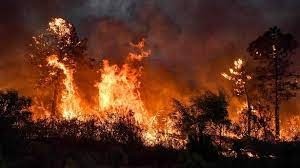
On Monday, 97 wildfires were reported to have started in 16 different provinces, devastating farmland, crops, and trees.
According to officials, over 8,000 firemen were battling to put out the fires.
In addition, 26 people were hurt, and 1,500 residents of Fenaia, Bejaia, Zbarbar, and Bouira had to leave their houses.
The Algerian defense ministry reported that ten troops died putting out the fires in Bejaia.
High winds in the hilly Kabylie region east of Algiers caused the largest fires to spread to residential areas in the seaside towns of Bejaia and Jijel.
The reasons of the fires are the subject of a legal inquiry, according to the authorities.
With temperatures approaching 48C, northern Algeria has recently experienced a record heatwave.
Several parts of North Africa are seeing temperatures that are up to 7C warmer than usual for the season.
The north of the country is expected to continue to see above-normal temperatures through the end of the month, according to the meteorological office for Algeria.
The national electricity and gas company of Algeria, Sonelgaz, reported on Monday that it had observed a “historic peak” in electricity usage.
Tout Sur l’Algerie (TSA), a prominent publication that regularly criticizes the government, claimed earlier this month that there had been a record-breaking use of air conditioners and that modern building techniques were ineffective at keeping dwellings cool compared to old brick construction.
Greece has been devastated by wildfires while southern Europe has been coping with a tough summer.
The World Meteorological Organization, the UN’s weather agency, has issued a warning that the heatwave in Europe might last into August and that severe temperatures are now the norm in a world warmed by climate change.
The EU’s Copernicus climate and weather agency claims that the three warmest days ever recorded occurred in July.
On Monday, July 3, the average worldwide temperature reached 16.89°C, and on Tuesday, July 4, it surpassed 17°C for the first time.
According to preliminary statistics, that was surpassed on July 5 when temperatures climbed to 17.05C.
Extreme weather patterns, according to the World Meteorological Organization, show that more needs to be done to combat climate change.
The likelihood of hot, dry weather, which is prone to start wildfires, is increasing due to climate change. Since the start of the industrial age, the world has already warmed by around 1.1C, and temperatures will continue to rise unless governments drastically reduce emissions.


Share your thoughts